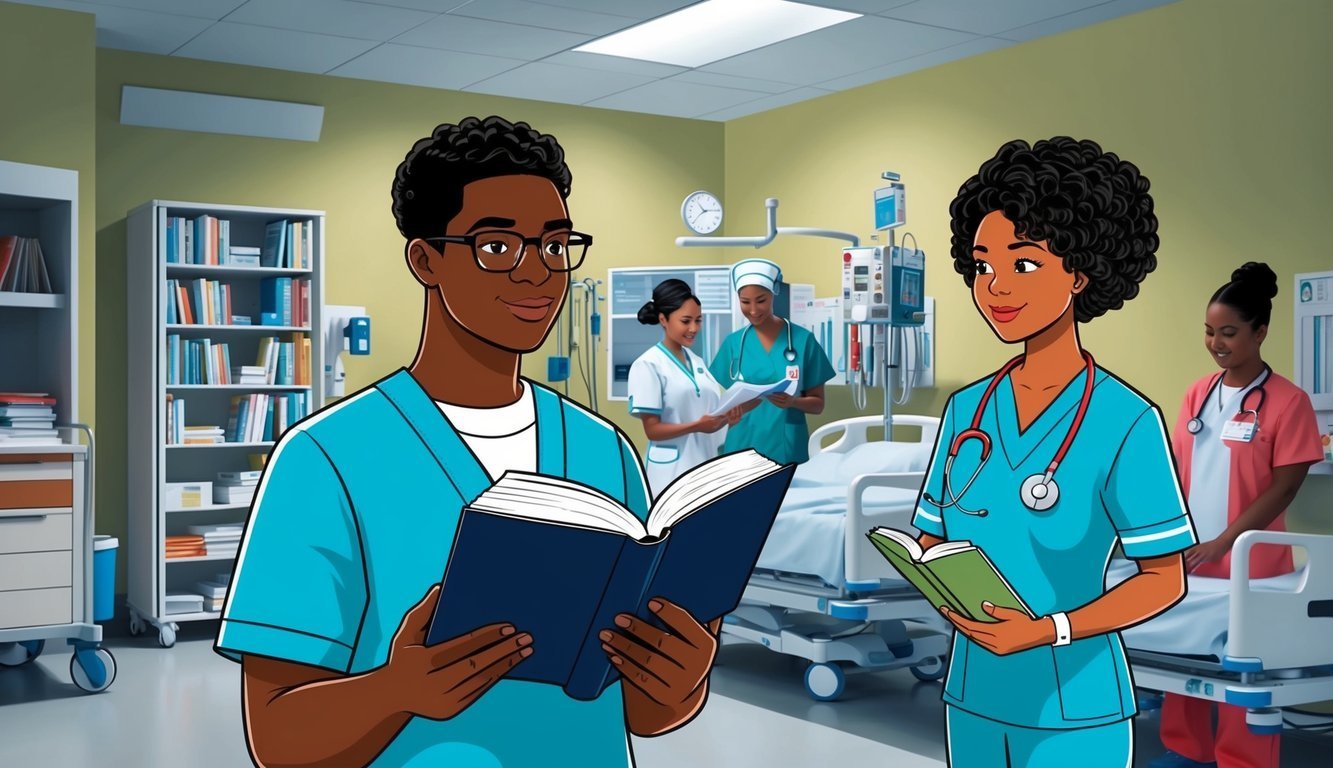If you hold a bachelor’s degree in a field other than nursing, you may wonder how to transition into a rewarding nursing career.
You can become a nurse without a nursing degree by enrolling in an accelerated BSN program designed for individuals like you.
These programs allow you to leverage your existing education while gaining the necessary nursing skills and knowledge in a shorter time frame.
The path to becoming a nurse involves meeting specific prerequisites, gaining clinical experience, and obtaining the necessary licensing.
You will need to research and prepare for admissions to ensure that you meet the criteria required by the accelerated programs.
With dedication and the right resources, your goal of becoming a nurse can soon be within reach.
Key Takeaways
- Accelerated BSN programs are available for those with non-nursing degrees.
- Clinical experience is a crucial part of the nursing education journey.
- Licensing is required to practice as a nurse and advance your career.
Understanding the Pathway
Transitioning to a nursing career with a non-nursing bachelor’s degree is a practical choice for many.
You can take specific steps to reach your goal of becoming a registered nurse.
Here’s an overview of the pathway and the options available.
Overview of a Non-Nursing Bachelor’s Transition
You start this journey by enrolling in an accelerated BSN program.
These programs are designed for individuals who already hold a non-nursing bachelor’s degree.
Typically, an accelerated BSN can be completed in 12 to 18 months, significantly shorter than traditional nursing programs, which usually take four years.
An accelerated program usually includes both classroom instruction and clinical experiences.
This combination prepares you to sit for the NCLEX-RN exam, which is essential for obtaining your nursing license.
In addition, some universities offer a Direct-Entry MSN program.
This option allows you to earn a master’s degree while preparing to become a registered nurse.
Types of Nursing Degrees
There are several nursing degrees you can pursue depending on your career goals:
| Degree Type | Description | Duration |
|---|---|---|
| BSN | Bachelor of Science in Nursing | 12-18 months (accelerated) |
| ADN | Associate Degree in Nursing | 2-3 years |
| MSN | Master of Science in Nursing | 2 years (if already a nurse) |
As someone with a non-nursing bachelor’s degree, focusing on an accelerated BSN is often the best path.
It allows you to quickly enter the nursing profession and pursue roles as a registered nurse.
Programs are widely available, so research different options to find one that fits your needs.
For more insights, visit Nurse.org.
Prerequisites and Admission Requirements
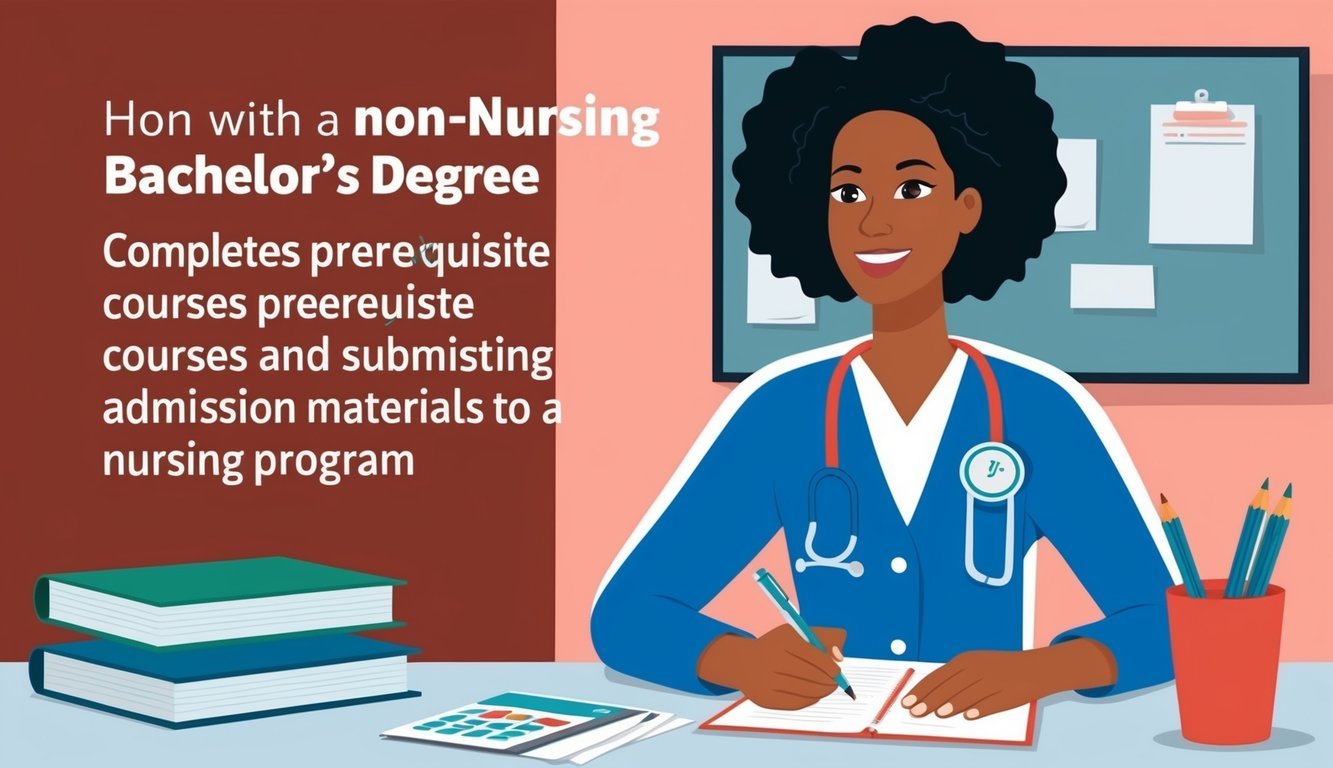
Becoming a nurse with a non-nursing bachelor’s degree involves specific prerequisites and admission criteria.
Understanding these requirements is essential to ensure that you meet all the necessary qualifications for your desired nursing program.
Required Prerequisite Courses
Most accelerated nursing programs require specific prerequisite courses.
Often, these include subjects such as:
- Anatomy and Physiology: Important for understanding the human body.
- Microbiology: Covers microorganisms relevant to health.
- Chemistry: Basic general chemistry is usually necessary.
- Statistics: Helps in understanding research and data.
Some programs may also require courses in psychology or sociology.
You should check the specific requirements for each program you are considering.
Meeting these prerequisites often accelerates your admission process.
Evaluating Academic Transcripts
When applying, you must submit your academic transcripts.
Schools will evaluate these to ensure you meet their minimum GPA requirements.
This typically includes:
- Cumulative GPA: Many programs require a minimum cumulative GPA, usually around 3.0 on a 4.0 scale.
- Course Grades: You may be expected to achieve a grade of “C” or higher in all required prerequisite courses.
Keep in mind that some programs will consider trends in your grades.
If you have shown improvement in your coursework over time, it may positively impact your application.
Admission Criteria Specifics
In addition to coursework and GPA, other admission criteria might apply.
These can include:
- Personal Statement: A written essay sharing your motivation to pursue nursing.
- Letters of Recommendation: Providing references from professionals in the healthcare field can strengthen your application.
- Interview: Some programs require an interview as part of the selection process.
It’s important to prepare all aspects of your application carefully.
Each nursing school may have its individual requirements, so check the specific details for each program.
You can find more information on accelerated nursing programs to help you get started.
Accelerated BSN Program Insights
Choosing an accelerated Bachelor of Science in Nursing (BSN) program requires careful consideration.
It’s important to understand the structure, length, and associated costs of these programs to make an informed decision.
Choosing the Right Accelerated BSN Program
When selecting an accelerated BSN program, accreditation is crucial.
Accredited programs ensure that you receive quality education and prepare you for licensing exams.
Consider programs like those at WGU, GCU, and Emory University for reputable options.
Evaluate the curriculum to ensure it covers essential nursing topics.
Look for programs with strong clinical placements for hands-on experience.
Be aware of the program format—some may be online, while others require in-person attendance.
Also, check the student support services available, as these can help you succeed during your studies.
Understanding Program Length and Structure
Accelerated BSN programs typically range from 12 to 18 months.
The structure often includes a combination of classes, labs, and clinical rotations.
For example, the University of Texas at Arlington offers a well-regarded ABSN program that emphasizes real-world experience.
Here’s a general outline of the program structure:
| Component | Duration |
|---|---|
| Coursework | 6-12 months |
| Clinical Rotations | 4-6 months |
| Total Program Duration | 12-18 months |
Make sure to review specific program calendars for exact timelines.
It’s essential to be prepared for an intensive learning experience, as these programs cover a lot of material in a short time.
Tuition and Financial Considerations
Tuition for accelerated BSN programs can vary significantly, typically costing between $20,000 and $50,000.
This cost often excludes additional expenses such as textbooks, uniforms, and clinical fees.
Here’s a breakdown of potential costs:
| Expense | Estimated Cost |
|---|---|
| Tuition | $20,000 – $50,000 |
| Textbooks | $1,000 |
| Clinical Fees | $500 |
| Uniforms & Equipment | $300 |
Investigate financial aid options to help cover these expenses.
Many institutions offer scholarships and loans specifically for nursing students.
Don’t forget to explore part-time work opportunities that can fit your schedule while studying.
Gaining Clinical Experience
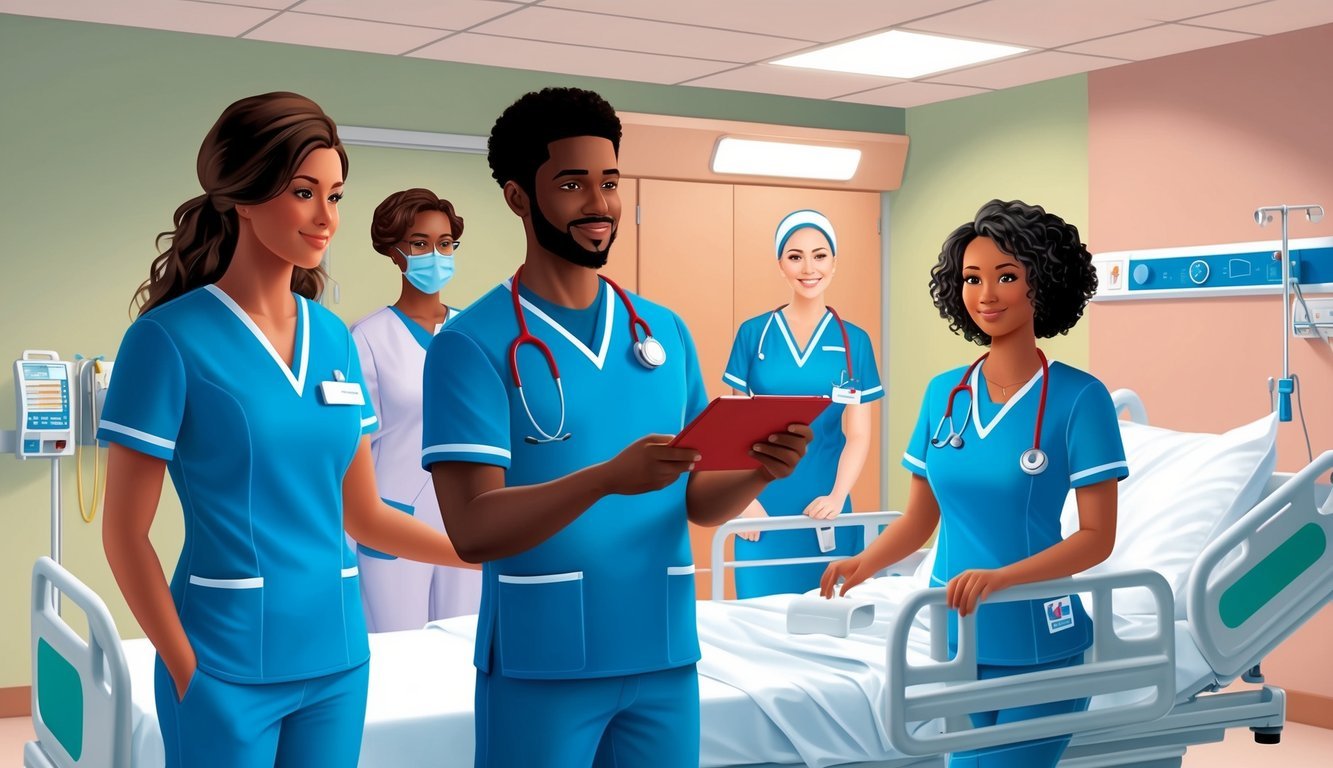
To become a nurse with a non-nursing bachelor’s degree, gaining clinical experience is crucial.
This experience not only helps you apply your knowledge but also prepares you for real-life patient interactions.
You will engage in clinical rotations and simulation labs that provide valuable insights into nursing practice.
Clinical Rotations and Simulation Labs
Clinical rotations are a key part of your nursing program.
During these rotations, you will work in various healthcare settings, such as hospitals and clinics.
This real-world experience allows you to observe and participate in patient care under the supervision of experienced nurses.
Simulation labs also play an important role.
These labs provide a safe environment to practice nursing skills without risk to patients.
You can engage in scenarios that mimic real-life situations, enhancing your critical thinking and decision-making abilities.
Both clinical rotations and simulation labs are essential components that build your confidence and skill set in nursing.
Importance of Hands-On Patient Care
Hands-on patient care is vital for your development as a nurse.
You will learn how to interact with patients, assess their needs, and provide appropriate care.
This direct involvement helps you understand the complexities of patient care.
During your clinical experiences, focus on communication and empathy.
You will work closely with patients, which allows you to build rapport and foster trust.
Such skills are crucial for effective nursing practice.
It’s important to embrace every opportunity during your clinical placements.
Whether you’re observing or participating, each experience contributes to your growth as a future nurse.
Licensing and Career Advancement
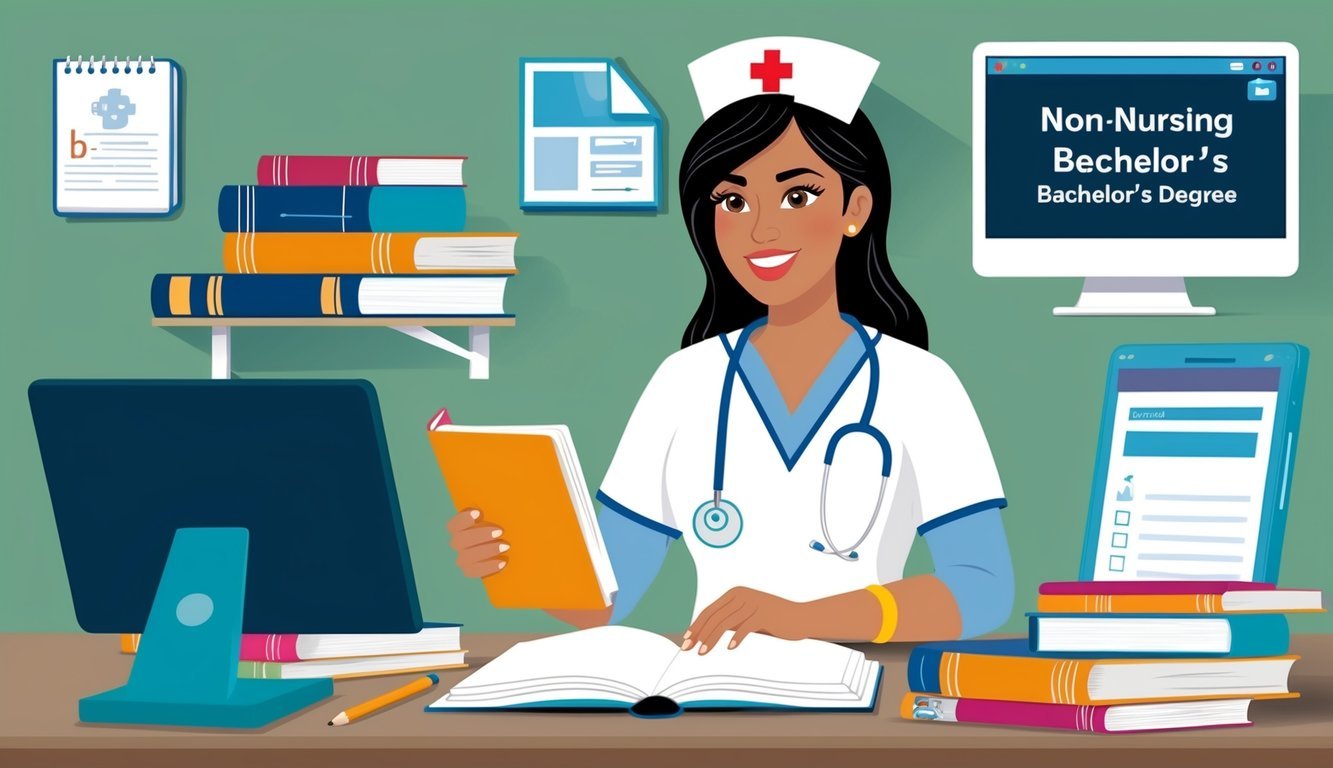
Becoming a nurse with a non-nursing bachelor’s degree is a great way to transition into healthcare.
To advance in your nursing career, you need to pass licensure exams, pursue further education, and explore various nursing specialties.
Preparing for the NCLEX-RN Exam
To become a licensed registered nurse (RN), you must pass the NCLEX-RN exam.
This test evaluates your knowledge and skills related to nursing practice.
To prepare effectively, consider these steps:
- Enroll in an accredited program: Ensure you attend a program that meets state requirements.
- Study resources: Use NCLEX review books, online practice tests, and study groups.
- Practice exams: Take full-length practice tests to familiarize yourself with the exam format.
Once you pass, you can apply for your nursing license through your state’s board of nursing, allowing you to practice as a licensed RN.
Advanced Nursing Education Options
Many nurses choose to pursue further education for career advancement.
Options include:
- Master of Science in Nursing (MSN): This degree allows you to specialize in areas like nurse practitioner or nurse educator.
- Direct-Entry MSN Program: Designed for those with non-nursing degrees, this program lets you earn an MSN without first completing a BSN.
- Advanced Practice Nurse (APN): With an MSN, you can become an APN, which opens opportunities in specialized care fields.
These educational paths enhance your skills and can lead to higher salaries and more responsibilities in healthcare.
Nursing Specialties and Career Paths
After you get your license, you can explore various nursing specialties based on your interests.
Some paths include:
- Nurse Practitioner (NP): As an NP, you can provide primary and specialized care, often with an expanded scope of practice.
- Clinical Nurse Specialist (CNS): Focus on a specific patient population, providing expert advice on nursing practices and treatments.
- Nurse Educator: Teach and mentor future nurses in academic settings.
Engaging in these specialties not only boosts your career satisfaction but also contributes significantly to patient care quality.
Explore accelerated programs and additional training that align with your career goals.
Take advantage of resources available from nursing education organizations to further your knowledge and skills.
Frequently Asked Questions
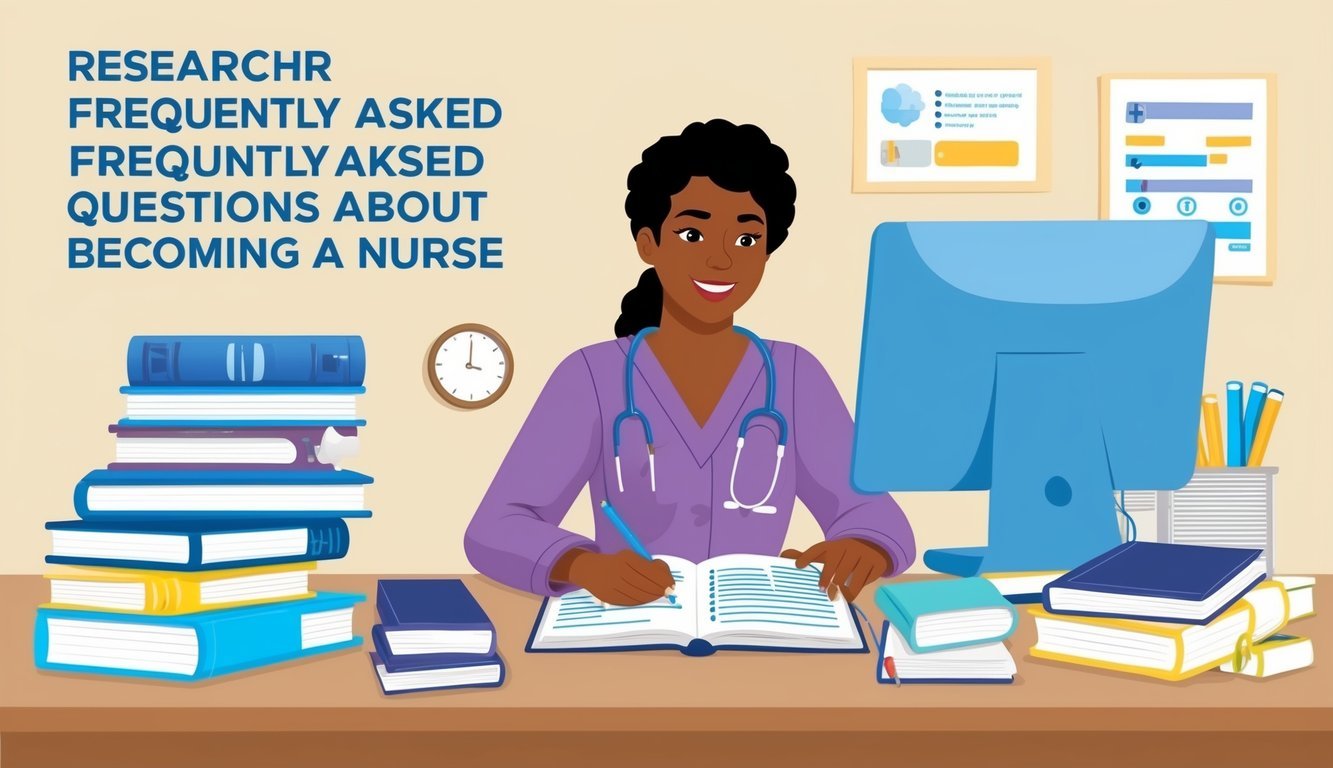
If you have a non-nursing bachelor’s degree and want to become a nurse, you likely have many questions.
This section addresses important aspects such as program options, prerequisites, and enrollment procedures.
What are accelerated BSN program options for individuals with a non-nursing bachelor’s degree?
Accelerated Bachelor of Science in Nursing (ABSN) programs are designed for those who already hold a bachelor’s degree in another field.
These programs can range from 12 to 20 months and offer an intensive curriculum.
Many universities provide these programs, allowing you to transition quickly into nursing.
For example, Nursing Process details essential steps and resources.
What are the prerequisites for nursing programs for those who hold a degree in another field?
Before entering an ABSN program, you typically need to complete specific prerequisite courses.
Common subjects include:
| Prerequisite Course | Description |
|---|---|
| Human Anatomy & Physiology | Understanding body systems |
| Microbiology | Basics of microorganisms |
| Nutrition | Fundamentals of dietary needs |
| Statistics | Basic statistics for health studies |
Check with your desired program for exact requirements.
Is it possible to become a registered nurse (RN) in a fast-track manner if one already has a bachelor’s degree in a non-nursing field?
Yes, obtaining a nursing degree in a fast-track manner is possible.
ABSN programs allow you to transition from a non-nursing background to becoming a registered nurse efficiently.
Students often complete intense coursework and clinical training in a short time.
You can explore options at various nursing schools.
How can one enroll in an MSN program with a non-nursing bachelor’s degree?
Many Master of Science in Nursing (MSN) programs welcome applicants with a non-nursing bachelor’s degree.
However, you may need to complete an ABSN program first.
Some programs offer bridge tracks designed for those without a nursing background.
You should check the specific criteria and application steps for each MSN program you are interested in.
Are there online programs available for obtaining a nursing degree for those with a non-nursing bachelor’s?
Yes, there are online ABSN and RN-to-MSN programs for individuals with non-nursing degrees.
Online programs can provide flexibility for working students.
Keep in mind that while coursework may be online, you will still need to complete in-person clinical experiences.
Research various accredited programs that fit your needs.
What steps are required to take the NCLEX for individuals with a non-nursing bachelor’s degree?
To take the NCLEX exam, you must first complete an accredited nursing program.
Steps generally include:
- Completing your nursing degree.
- Applying for licensure in your state.
- Registering for the NCLEX exam through Pearson VUE.
- Scheduling and taking the exam.
Make sure to check your state’s Board of Nursing for specific licensing requirements and processes.

